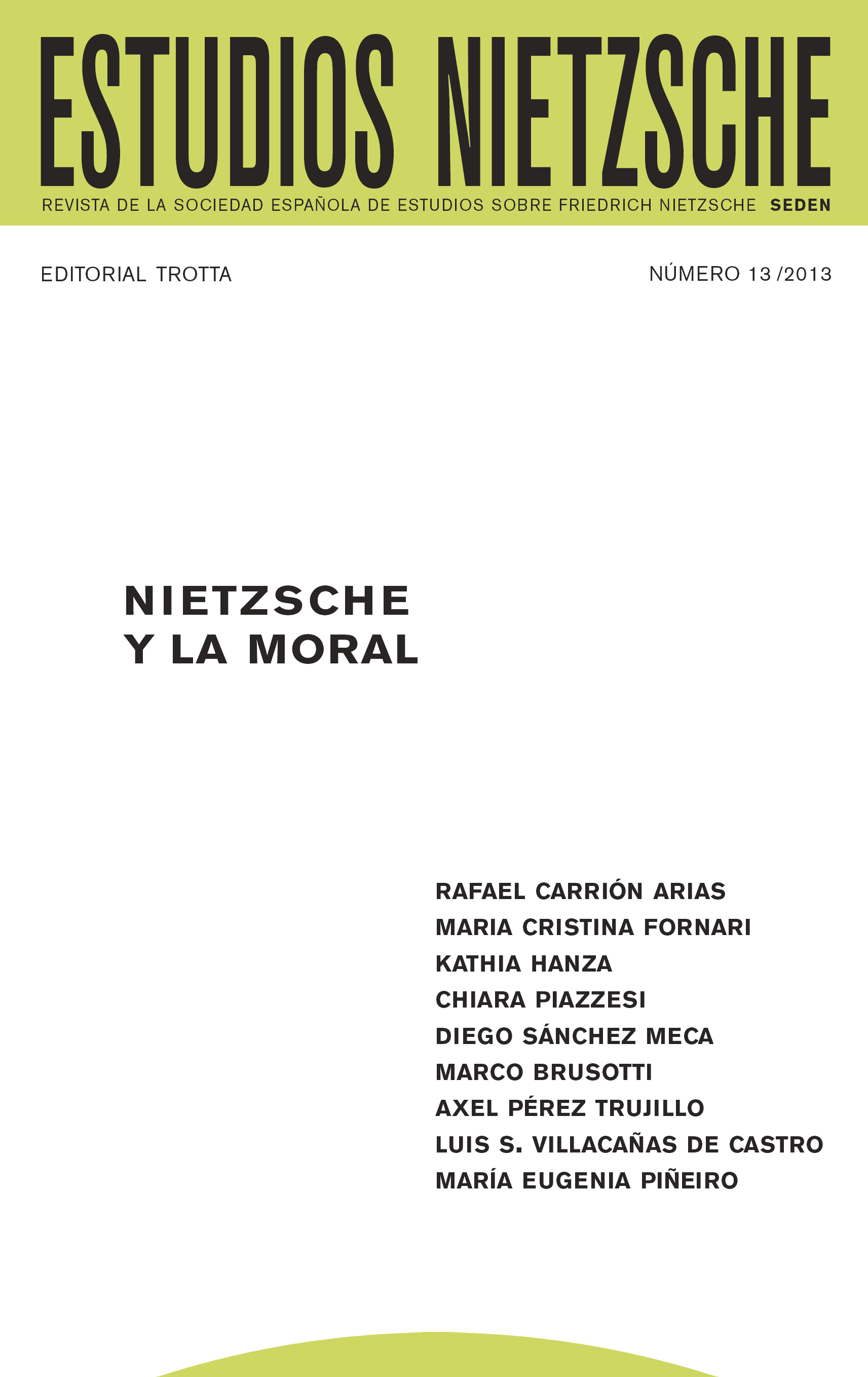Nietzsche and the Critical-Genealogical Method
DOI:
https://doi.org/10.24310/EstudiosNIETen.vi13.10692Keywords:
critical method, genealogy, history, ideology critiqueAbstract
One of the main contributions made by Nietzsche to the History of Philosophy is his method. Taking form in his practice as a philologist, this method changes his object in the course of the development of Nietzsche’s thinking, but it remains essentially one of the most original forms of critical analysis in modernity. This paper intends to show its main features, as the late Nietzsche employs them for the demystifying critique of
metaphysics and morals.
Downloads
Metrics
References
Bachmann-Medick, D., (ed.), Kultur als Text: die anthropologische Wende in der Literaturwissenschaft, Frankfurt: Fischer Taschenbuch, 1996.
C. Benne, Nietzsche und die historisch-kritische Philologie, Berlin/Nueva York: Walter de Gruyter, 2005, pp. 144-146.
Bauer, S., Polisbild und Demokratieverständnis in Jacob Burckhardts “Grieschischer Kulturgeschichte”, Basel/München: Beck, Schwabe 2001.
Blondel, E., Nietzsche. Le corps et la culture: La philosophie comme généalogie philologique, Paris: PUF, 1986.
Borchme, D., - J. Salaquarda, (ed.), Nietzsche und Wagner, Stationen eine Epochalen Begegnung, Frankfurt a. M.: Insel, 1994.
Burckhardt, J., Weltgeschichtliche Betrachtungen. Historische Fragmente aus dem Nachlass, en Gesamtausgabe, vol. 7, Einleitung, I, Basel, 1929-34.
Burckhardt, J., Griechischen Kulturgeschichte, en Gesamtausgabe, Basel/Darmstadt: Wissenchaftliche Buchgesellschaft, vols. 8-11, 1929-34.
Conill, J., «Hermenéutica genealógica desde el cuerpo»: Estudios Nietzsche 9 (2009), p. 19.
Geertz, C., The Interpretation of Cultures, London, Hutschison, 1975.
Heidegger, M., Sein und Zeit, Tübingen: Niemeyer, 1979.
Lenk, C., Kultur als Text: Überlegung zu einer Interpretationsfigur, en R. Glaser, M. Luserke, Literaturwissenschaft-Kulturwissenschaft: Positionen, Themen, Perspektiven, Opladen: Westdeutsche Verlag, 1996.
Lukács, G., Geschichte und Klassenbewusstsein, §2: «Die Antinomien des bürgerlichen Denkens», Berlin: Malik Verlag, 1923, pp. 209-267.
Marquand, O., Genealogie, en Historisches Wörterbuch der Philosophie, III, Basel/Darmstadt: Wissenschaftliche Buchgesellschaft, 1974.
Meyer, K., Ästhetik der Historie. Friedrich Nietzsches «Vom Nutzen und Nachteil der Historie für das Leben», Würzburg, 1998.
Nietzsche, F., Obras Completas, I-IV (OC ). Director ed. Diego Sánchez Meca. Madrid: Tecnos, 2011-2016
Nietzsche, F., Correspondencia I-VI. (CO). Director ed. Luis E. de Santiago Guervós. Madrid : Trotta, 2005- 2012.
Nietzsche, F., Fragmentos Póstumos I-IV (FP). Director ed. Diego Sánchez Meca. Madrid: Tecnos, 2006-2010.
Ruhstaller, P., Burckhardt und Nietzsche. Deutungen einer vieldeutigen Beziehung, Universität Zürich, 1988.
Salin, E., Jacob Burckhardt und Nietzsche, Basel, 1937.
Sánchez Meca, D., Nietzsche. La experiencia dionisíaca del mundo, Madrid: Tecnos, 2009.
Sommer, A. U.., Der Geist de Historie und das Ende des Christentums. Zur “Waffengenossenschaft” von Friedrich Nietzsche und Franz Overbeck, Berlin, 1997.
Stegmaier, Nietzsches “Genealogie der Moral”, Darmstadt: Wissenschaftliche Buchgesellschaft, 1994.
Strong, T. B., Deconstruction of Tradition: the Greeks and Nietzsche, en Th. Darby, (ed.), Nietzsche and the Rhetoric of Nihilism: Essays on Interpretation, Language and Politics, Ottawa: Carleton, 1989.
Downloads
Published
How to Cite
Issue
Section
License
As of issue 21 (2021) this journal is published only in open access (diamond route).
From that number 21, like the previous numbers published in NIETZSCHE STUDIES, they are subject to the Creative Commons Acknowledgment-NoComercia-ShareIgual 4.0 license, the full text of which can be consulted at <http://creativecommons.org/licenses/by-nc-sa/4.0 >
It is the responsibility of the authors to obtain the necessary permissions of the images that are subject to copyright.
This work is licensed under a Creative Commons Attribution-NonCommercial-ShareAlike 4.0 International License.
Copyright generates two different rights: moral rights and patrimonial rights that EJFB recognizes and respects. Moral rights are those relating to the recognition of the authorship. They are rights of a personal nature that are perpetual, inalienable, unseizable and imprescriptible as consequence of the indivisible union of the author and his/her work.
Patrimonial rights are those that can be derived from the reproduction, distribution, adaptation or communication of the work, among others.







11.png)
